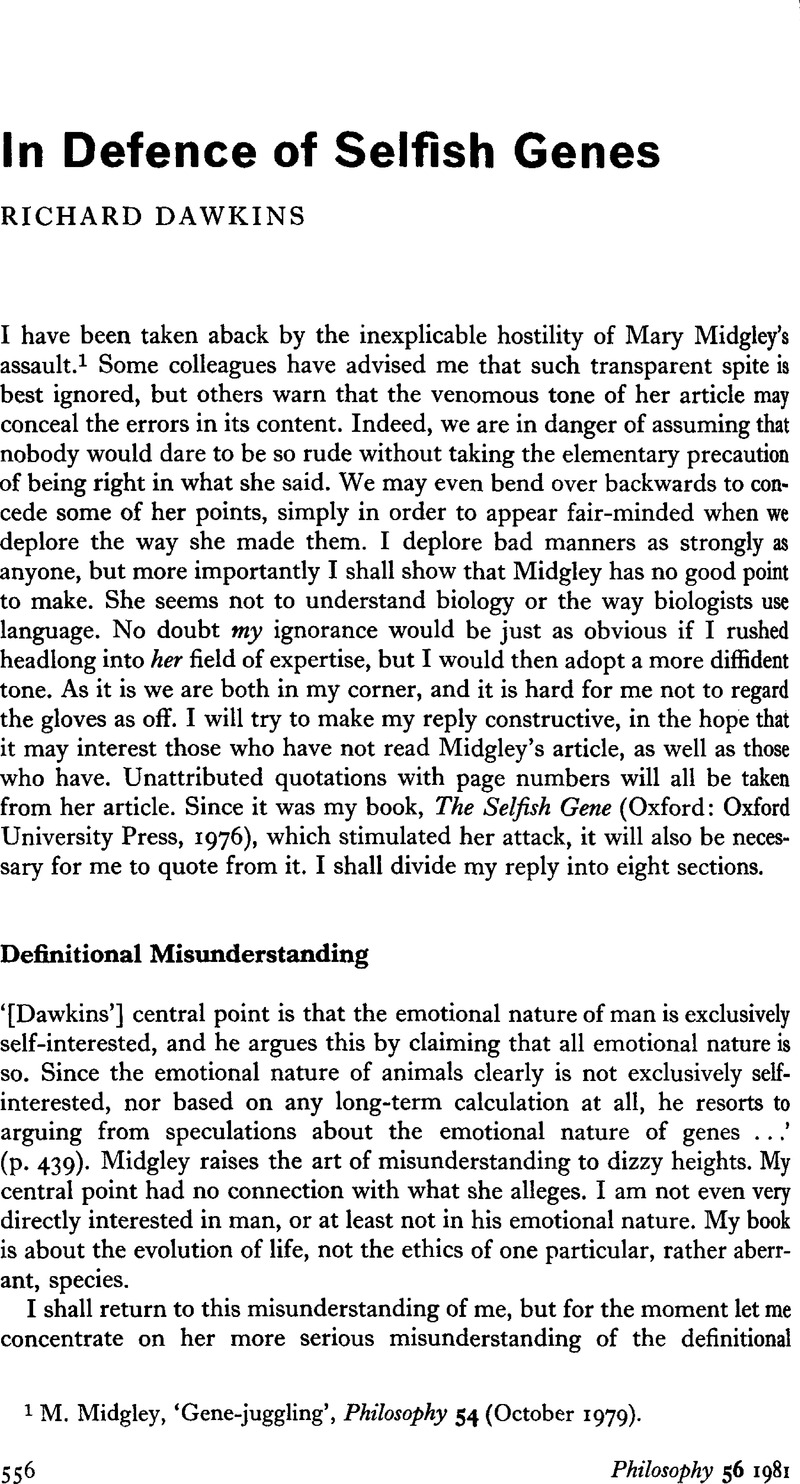Article contents
In Defence of Selfish Genes
Published online by Cambridge University Press: 30 January 2009
Abstract

Information
- Type
- Discussion
- Information
- Copyright
- Copyright © The Royal Institute of Philosophy 1981
References
1 Midgley, M., ‘Gene-juggling’, Philosophy 54 (10 1979)CrossRefGoogle ScholarPubMed.
2 She recommends her own book (Midgley, M., Beast and Man, Hassocks: Harvester Press, 1979Google Scholar) ‘For a fuller discussion of sociobiological ideas…’
3 Dawkins, R., ‘Replicator Selection and the Extended Phenotype’, Zeitschrift für Tierpsychologie 47, 61–76CrossRefGoogle Scholar.
4 It is hard to resist a flourish as I quote almost exactly the same words from a recent, forward-looking review by Francis Crick, architect (with J. D. Watson) of the modern molecular concept of the gene: ‘The theory of the “selfish gene” will have to be extended to any stretch of DNA’ (Crick, F. H. C., ‘Split Genes and RNA Splicing’, Science 204 (1979), 270CrossRefGoogle ScholarPubMed). Crick's point is elaborated in two further molecular biological papers whose titles betray no coy reticence about applying the word ‘selfish’ to DNA molecules! (Orgel, L. E. and Crick, F. H. C., ‘Selfish DNA: the Ultimate Parasite’, Nature 284 (1980)CrossRefGoogle ScholarPubMed; Doolittle, W. F. and Sapienza, C., ‘Selfish Genes, the Phenotype Paradigm and Genome Evolution’, Nature 284 (1980)CrossRefGoogle ScholarPubMed. As for my definition of the gene, its derivation from Williams is not word for word, but I have conveyed the clear message of pp. 22–25 of his Adaptation and Natural Selection (New Jersey: Princeton University Press, 1966). My definition is a rendering, for laymen, of two technical sentences from these pages of Williams: ‘I use the term gene to mean “that which segregates and recombines with appreciable frequency”’; and ‘a gene could be defined as any hereditary information for which there is a favorable or unfavorable selection bias equal to several or many times its rate of endogenous change’.
5 Benzer, S., ‘The Elementary Units of Heredity’, The Chemical Basis of Heredity, McElroy, W. D. and Glass, B. (eds) (Baltimore: Johns Hopkins, 1957)Google Scholar.
6 Hull, D. L., ‘The Units of Evolution: a Metaphysical Essay’, Studies in the Concept of Evolution, Jensen, U. J. and Harré, R. (eds) (Hassocks: The Harvester Press, in press)Google Scholar. In view of her spirited remark that I should either learn to do metaphysics or retreat out of sight altogether, Midgley might be amused at the following from Hull's manuscript: ‘Although he is likely to be shocked, if not offended, at being told so, Dawkins (1976, 1978) has made an important contribution to the metaphysics of evolution in his explication of “replicators”. Like Monsieur Jourdain, who was astonished to discover that he had been speaking prose all his life, Dawkins may well be equally surprised to discover that he has committed an act of metaphysics’.
7 Gould, S. J., ‘Caring Groups and Selfish Genes’, Natural History 86 (12 1977)Google Scholar. Gould is a well-known palaeontologist who would probably be surprised at Midgley's description of him as ‘a geneticist’ (Beast and Man, 66). Midgley, in turn, might be surprised at some of the things Gould has written elsewhere, for instance: ‘Natural selection dictates that organisms act in their own self-interest. They know nothing of such abstract concepts as “the good of the species’. They “struggle” continuously to increase the representation of their genes at the expense of their fellows. And that, for all its baldness, is all there is to it; we have discovered no higher principle in nature’ (Gould, S. J., Ever Since Darwin (London: Burnett Books, 1978), 261Google Scholar).
8 In Hamilton's opinion too, as is clear from his reviews of both our books (and by the way, nobody in the world is better qualified to review either of them): Hamilton, W. D., review of The Selfish Gene (Science 196, 1977, 757–759)CrossRefGoogle Scholar; Hamilton, W. D., review of Sociobiology (Journal of Animal Ecology 46, 1977, 975–983)CrossRefGoogle Scholar.
9 Some of the more constructive arguments in this paper are developed further in my forthcoming book, The Extended Phenotype (Oxford: W. H. Freeman & Co., 1982).
- 50
- Cited by

